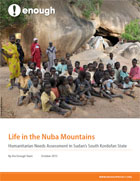
This report offers a holistic assessment of humanitarian needs in South Kordofan state, based on field research conducted in July–August 2013 by anonymous researchers. Due to security concerns, the organization wishes to remain anonymous but requested that the Enough Project publish the report. Given the lack of access to these rebel-held areas, there has been little information made public about the situation on the ground. This report strives to fill in some of these gaps. An independent humanitarian expert, Steven Hansch, has endorsed the methodology of the study, “Life in the Nuba Mountains” which paints a holistic picture of a place where internationals are not given permission to enter. The accompanying policy brief, “Aid as a Weapon of War in Sudan,” offers a way forward.
New information about life in rebel-held areas of South Kordofan state:
-
For the first time, researchers collected non-nutrition indicators on education and sanitation
- 71% have never been to school, only 3% had attended anything beyond primary school
- 90% practice open defecation; only 2% use an improved sanitation facility
- 65% of households did not have soap readily available, the WHO has found that washing hands with soap could reduce diarrheal associated deaths by up to 50%
-
Food insecurity remains a serious concern and coping strategies are being stretched
- 62% of adults are restricting their own food consumption so that children can eat.
- 43% of surveyed households do not even have enough food to last a week
- 69% of displaced and 64% of nondisplaced experience moderate or severe hunger
- As a result of intense bombardment during the planting and harvesting season, households are cultivating 73% less land than before the conflict erupted.
- On average, displaced children eat 2 meals/day while displaced adults eat 1.5 meals daily. Malnourished children are 9 times more likely to die according to UNICEF
- 83% say they are reducing the number of meals they eat around 3.5 times a week to cope with the lack of food, 80% are limiting the portion sizes with similar frequency.
-
Preventable diseases and risks are going undeterred
- 76% of households do not have any mosquito nets; in 68% of households, a child had malaria in the preceding month. The WHO has found that mosquito nets reduce overall child mortality by 18% and malaria infections by at least 50%
- 77% of mothers gave birth without assistance from a skilled attendant and 9% gave birth completely alone.
Read our accompanying policy brief, “Aid as a Weapon of War in Sudan,” which offers recommendations for a way forward.

